#olympicsailing – We have heard much of how the 2016 Olympiad Sailing Venue in Rio de Janeiro is setting its courses in polluted waters which will constitute a serious health risk to the participants and those who are afloat staging the races. While we are assured that this contamination problem is well on the way to a solution – which will be something of a miracle in a seething, overcrowded and unruly harbourside megalopolis like Rio - questions were still being asked about water quality at an Irish Sailing Association publicity event this week to report progress by our Olympic Sailing squad.
The Olympic Squad is in its turn under the aegis of ISA Performance, and is sponsored by Providence Resources, the oil exploration company which achieved a high profile some years ago when it sought a licence to drill off Dalkey. That notion now seems very much on the back burner, and they seek the priceless gas and the black gold elsewhere. But meanwhile, Providence Chairman Tony O'Reilly gently made the point this week that all-access Olympic tickets for Rio 2016 are already well into the gold dust league, and he trusted that their support would see the Providence team being looked after in that department by the ISA's Olympics managers.
In other words, the Rio Olympics will be the complete mega-event. And while sailing will only be a part of it, to be part of something so huge is as big as sailing – and in particular Irish sailing – can ever get.
The press gathering was held on Wednesday 5th August in one of the trendier Dublin hotels, the date being selected as it marked exactly 12 months to go to the start of the 2016 Olympiad, and it was also a convenient assembly time for those of the team who weren't in Rio already, as they've to be there for the Aqueece Rio – the International Sailing Regatta 2015 – from August 13th to 22nd. This will be staged on the Olympic sailing courses, so by 22nd August many of the questions which were hovering around this week's gathering will have some sort of answer.
But this press assembly also happened to be plumb in the middle of the one week in the Dublin year when everyone who is anyone has decamped from town on the holiday break, or gone to the Horse Show. However, Afloat.ie's heroically unfashionable W M Nixon was at home, so he went along, and was only slightly surprised to find that, by so doing, he increased the number of print and online journalists present by one hundred per cent, as the short RTE Television News item was made outside in a brief flash of sunshine, so their people weren't part of the throng. And from it all, Nixon wondered if, in addition to the hazards of polluted water for Olympians, does the very fact of Irish sailing's reliance on the Olympics for a public profile in its turn poison Olympic sailing's relationship with the rest of our hugely varied and often unmeasurable sport?
One of the problems with the Olympic Games is that we are in an era when Living For The Moment is the code by which most people aspire to conduct their lives. The most positive spin you can put on that is to call it Mindfulness. But it doesn't sound quite so good when you describe it as Instant Gratification with Entertainment for People With The Attention Span of a Gnat. And that's probably unfair to the Gnat Community anyway.
Whatever, today's attitude means that the four year Olympic cycle seems like eternity. How on earth can you keep people interested in the event and its athletes for the intervening three years and six months when nothing much of public interest is happening. Even the mildly-interested sailing public can only tolerate a certain amount of spin when results obtained in associated buildup regattas and championships are not as good as hoped. For everyone else, all that really matters is what starts to happen in Rio on August 5th 2016.
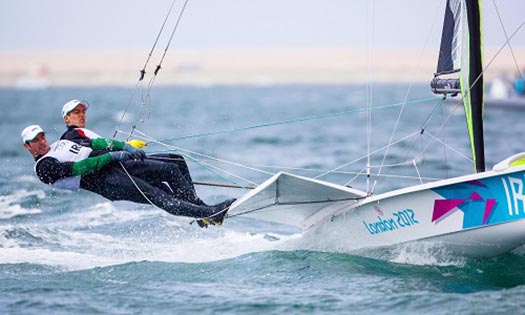
Not for everyone. The specialised nature of today's Olympic sailing is personified by Belfast Lough's Ryan Seaton and Matt McGovern with the 49er.
So meanwhile we find the Olympic followers are much exercised by such matters as the water quality in Rio – of which more anon – and the usual international doping scandal. The possibility of our sailors doping-up seemed to interest the other scribbler at the press conference so much that I resisted the temptation to throw in the old quip about sailors being the only athletes who take performance-enhancing drugs after the event, as a sense of humour failure was likely in taking aboard the notion that a pint or three after a race makes your performance look so much better in restrospect, as in: "It took a helluva lot of boats to beat us, and all of them good ones".
Be that as it may, many in Irish sailing wonder why our Olympic Sailing Squad seem to exist in their own pampered bubble, functioning virtually independently of the rest of us, with the bulk of Irish Sports Council funding for sailing being channeled straight into the Olympic effort. Roughly, the funding breakdown – based on the ISA's own figures for 2014 - is as follows:
Income
Capital grants received from Irish Sports Council (ISC) for expenditure on boats, fitness equipment and motor vehicles - €250k
ISC general allocation - €678k
Carding grants from ISC - €148K
Income from academy squad participants, etc - €93k
Sponsorship and sundry income (Providence Team IRL) - €101k
Total Funding Received - €1,270k
Expenditure
Expenditure on equipment - €250k
Carding grants - €148k
Payroll costs - €228k (for High Performance staff x 3)
Administrative costs - €82k (mainly staff travel and subsistence)
International competitions - €92k (both Academy and Olympic)
Preparation - €59k (Academy and Olympic)
Contracted coaches etc - €350k (Academy and Olympic)
Performance services - €82k (sports science and conditioning)
PR & communications - €32k
Total Outlays - €1,323k
It's much smaller than many other national Olympic sailing budgets, but nevertheless one million three hundred and twenty three thousand euro may seem a very substantial annual outlay for something which personally involves only a handful of Irish sailors, and they are sailing a variety of boats in which the only class with a significant national presence is the Laser. And it's all aimed at an event which only takes place every four years.
But that's the way the world is, and the Sports Council's Kieran Mulvey has made no secret of the expectation that sailing is among the tops for Ireland's Olympic hopes. The fact that Annalise Murphy came within an ace of a medal at the 2012 Games has kept the fire burning for 2016, and it will stay burning for 2020 in Tokyo, as the ISA Performance Division are picking up the emerging talents and pointing them in the 2020 Olympic direction. This might seem to have a bit of the Big Brother about it, but the Olympic ideal can provoke an almost messianic zeal among its adherents.
One of the results of this is that those who care about our sport, and are genuinely concerned about the welfare of the top individuals involved, feel that far too much pressure of expectation is being put on Annalise Murphy, and in a recent Irish Times article, David O'Brien articulated a widespread concern about the situation.
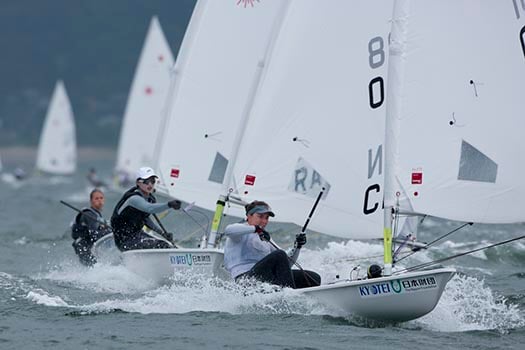
Doing what she does best. Annalise Murphy at the head of the fleetin a good breeze of wind
Yet at this week's gathering, it has to be said that our sailing Olympians and wannabe Olympians gave a very good and pleasant account of themselves. They're nice bright people, and you can see how the folk in the Sports Council must secretly harbour the wish that all Ireland's international athletes could be as personable and communication-friendly as the sailing squad.
Thus those of us who think it ridiculous that Olympic sailors are forced to perform much too near the shore in order to satisfy spectator and televiewing demands found it thought-provoking to hear someone like 49er sailor Ryan Seaton saying that they've all accepted that this is the way it is in the modern world, and instead of grumbling about it, you just have to get on and make the best of it, for it's the same for everyone.
Speaking as one who still harbours the feeling that Annalise Murphy would have won a medal if the final race of the 2012 Olympics had been held in clear air a good mile and more offshore, instead of close along the land at Weymouth, it was heartening to observe her mature response, accepting that it had happened the way it did, and that you have to move on, even if she knows she personally will never totally get over missing that medal.
As the face of Irish sailing, inevitably Annalise was the one who had to field the questions about the water in Rio, and at the press conference she gave the measured response that she has now been sailing for a total of four months at the Rio venue over the past three years, and the water quality has undoubtedly improved. But when this was cut down for a soundbite for Wednesday evening's RTE television news, it was no more than a damning quote that the water at Rio was the worst she had ever sailed on.
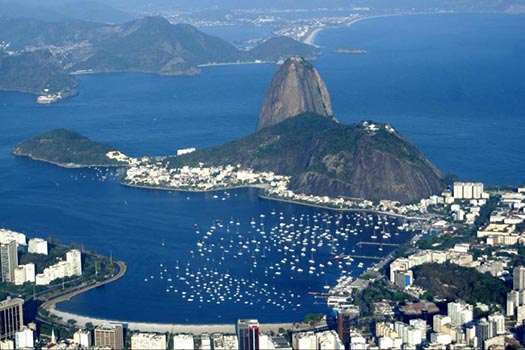
"January River". Rio de Janeiro is OTT in the scenery stakes – Naturalist and evolutionist Charles Darwin in 1832 described it as "unreal, like some kind of immense theatrical stage". The Olympic sailing events will be staged in the waters close beyond the famous Sugarloaf (Pao de Acacar)
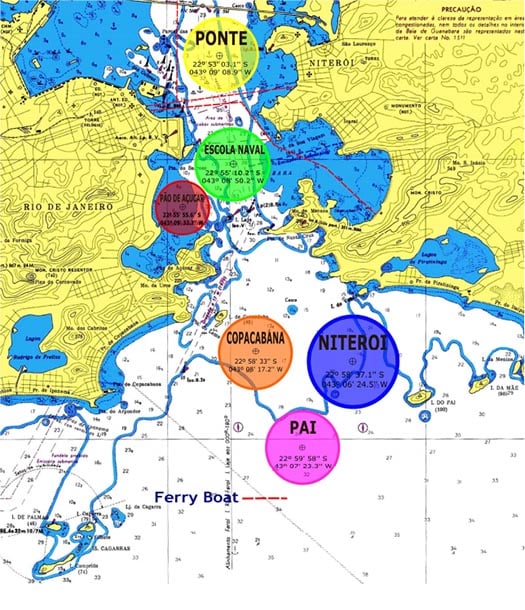
The sailing areas for next week's regatta in Rio will be a rehearsal for the 2016 Olympics, and will be staged on these course areas which are currently planned as the locations for 2016
But what of the Rio de Janeiro venue? The Olympic movement anticipated today's tourism priorities by settling on cities rather than countries as the setting for their quadrennial Games, and with sailing already being out on a limb, sometimes the sailors have to accept that conditions will be less than perfect if they're going to feel they're really an integral part of the city-based games.
So we have to face the reality that the glamour of the Rio de Janeiro venue – regardless of the quality of the water – is going to attract world attention, as is the fact that the proposed racing area is as nearly as possible plumb in the middle of town.
Rio de Janeiro's very name is evocative, yet it means no more than "January River". But its exceptional and startling beauty has been long known – even the utterly scientific and often depressive Charles Darwin was moved to write of Rio harbour, when he sailed in aboard HMS Beagle in 1832, that it was "unreal, like some kind of immense theatrical stage".
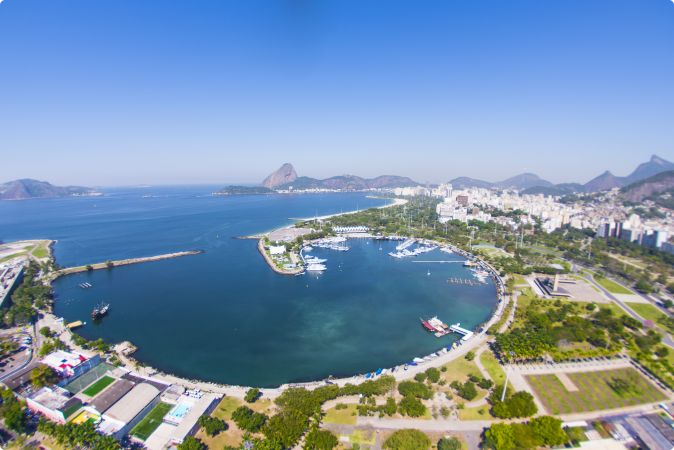
Marina da Gloria will be the headquarters for the sailing at the Rio Olympics
An immense natural theatre, an exuberant and hyper-colourful city, and the attention of the world focused on it – this is sailing's big chance, and Ireland's sailors will be there in the thick of it as sailing battles on to keep its place in the Olympic pantheon. But somehow, while there's no doubt we'll all bask in the reflected glory if our sailors take a medal, the level of dedication required seems to make Olympic sailing ever more remote, and to some extent this must poison the relationship with sailing in general, particularly if the outcome is judged unsuccessful.
So Olympic sailors stay apart. The fact that Irish Olympic sailing is very much its own show was emphasized by the fact that at the select gathering on Wednesday, there didn't seem to be any members of the ISA's Board of Directors present. Indeed, there were only two ISA staffers there who are not engaged in almost total involvement with the Olympic endeavour, and one of those was the recently-appointed Press Officer, whose work is already much taken up with the ongoing Olympic effort, and will inevitably be almost totally focused on it by next year.
So how has this Secret Society state of affairs come about? It's simple, really. For the vast majority of humanity, competitive sailing only exists as an Olympic sport. And in Ireland, sailors only become household names when they are seen as contenders for an Olympic medal. The rest of us in sailing are invisible unless we happen to drown, or at the very least are the reason for some dramatic and preferably very expensive rescue. Then we hit the headlines.
But apart from that, the whole absurd, complex, boat-loving and intensely private world of sailing, with its own quaint language, is utterly incomprehensible to a people who tend mostly to see the sea as no more than a handy form of air conditioning. So absolutely the only way to attract positive attention and get substantial government funding is through keeping the Olympic sailing flame alive.
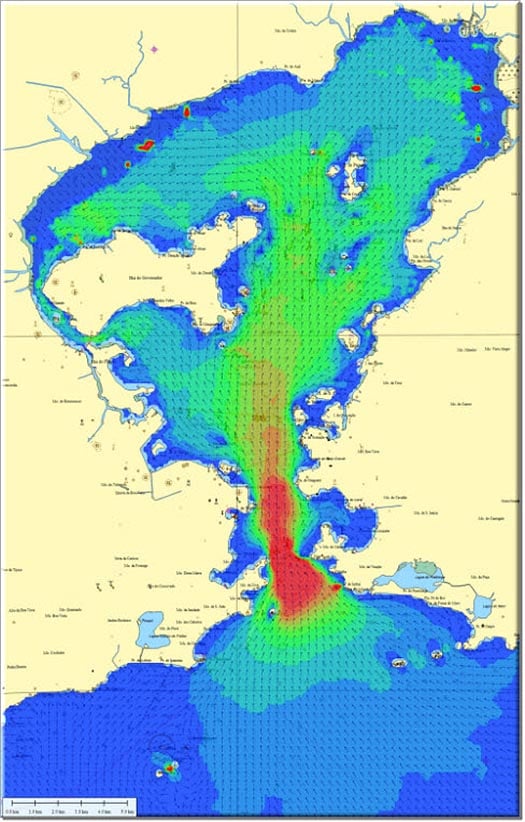
How things have changed......the ideal for Olympic sailing for many years was that the races should be staged as clear as possible from interference to the wind by land formations, while the race course should have negligible tides. This detailed tidal stream map of the Olympic sailing venue at Rio shows that tidal skills will be at a premium, while technique in handling light and flukey winds greatly influenced by the land will surely be a priority.
Which isn't easy, for although Ireland probably has more than the average proportion of people who live for the Olympic ideal, in the hidden conclaves of power within the international Olympic organisation, they're increasingly going strictly by the numbers game. Not the numbers or proportion of the population who are interested in the Olympics or a particular sport, but rather the numbers worldwide who will watch each event on television in their tens of millions. And it's no secret that sailing has been told by the Gods of Olympia that if we want to stay in the Games we somehow have to make our sport more telly-friendly, for the viewing numbers weren't all that great in 2012.
Nevertheless, in the final analysis it's up to all of us whether or not we let Olympic sailing's rarefied atmosphere poison its relationship with mainstream sailing and boating. A bit of maturity will help to accept that the squad for Rio, and for Tokyo beyond that, will be made up of people who have emerged from the giant slow-cooking stew which is Irish sailing. As the date of the Olympics approaches, they'll be taken ever more totally into their special bubble. But they need the links outside. On Wednesday, young Finn Lynch – a hopeful for 2020 - was asked how he found it racing at adult level, and he admitted it was tough, so much so that he was looking forward to returning to "normal" international junior event s later this month.
And in chatting with coach Rory Fitzpatrick, I learned that he would be unwinding down in Schull after they get back from Aqueece Rio, and had a notion of taking a spin around the Fastnet with his foiling Moth. It reminded me of the way Damian Foxall's eyes light up when he recalls sailing out from Derrynane as a young fellow with his Laser to the Bull Rock far on the horizon, and zapping through the hole in the middle of it when no-one was looking.
But as for Moths around the light of the Fastnet, that should be a race, not a solo sprint. And quite a race it would be too. But for now, the Olympic sailing focus closes in on Aqueece Rio. Yet for the rest of us, there's also the 90th Anniversary Fastnet on August 16th. More on that next week.
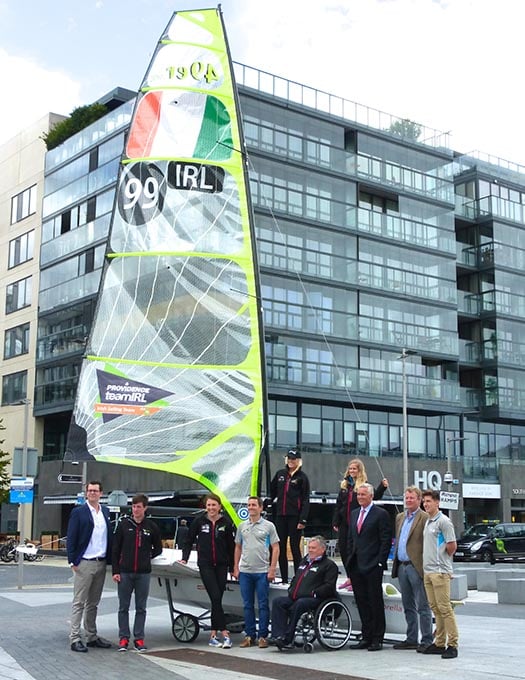
Light years away from the sunlight and warmth of Rio de Janeiro – Irish Olympic sailors and supporters on a very unseasonal August afternoon this week in Dublin. Photo: W M Nixon































































